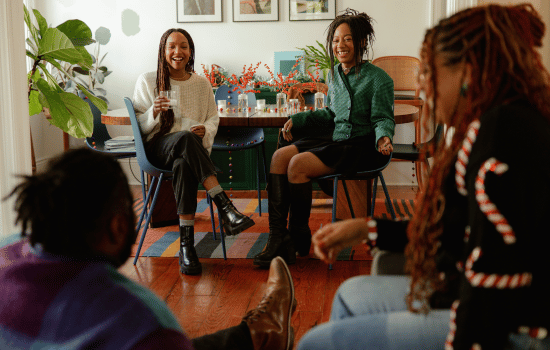8 Questions to Ask When Entering a Polyamorous Relationship
The holidays are often associated with family gatherings and festivities. No matter what holiday you celebrate, this time of year tends to bring people together to share joy and create lasting memories. However, it’s also a stressful, and even scary topic, for those who are estranged from their loved ones or don't plan to spend the holidays with them.
Ethical non-monogamy (also called consensual non-monogamy) is something many people don't understand, so many who identify as poly are forced to hide it from their loved ones out of fear that they won’t be accepted.
This is unfair, but unfortunately happens to all too often. If this has happened to you, know it’s valid to feel nervous or apprehensive about visiting with family - some of which you probably only see once or twice a year - this holiday season.
Entering a new poly relationship in the 30-some-odd days between now and the end of the year is exciting and something you should enjoy every moment of. Don’t let unanswered poly questions surprise you, especially during what can be an anxiety-ridden time.
Wondering exactly what questions to ask before entering a polyamorous relationship? Let's get started.
8 questions to ask when entering a polyamorous relationship
Here are some of the most important things I suggest asking your partner when entering a polyamorous relationship: holiday edition. Remember that every polycule is different, so some questions may not fit your relationship dynamic. However, they can be abbreviated or altered to help you discover how to make your holiday season more enjoyable with your loved ones.
1. What is my definition of support? What does our support system look like?
Start the holiday season by defining what support means to you and what your polycule’s support system looks like. Ask yourself and your partner poly questions like, who can you trust to be in your corner when a family gathering goes south?
It’s crucial to establish clear lines of communication in and out of your polycule, discuss your expectations, and give everyone a chance to feel heard.
However, sometimes, the best way to support your partners is to respect their autonomy. When people feel self-sufficient, they can lean on others for support when they want to, not because they have to. Either way, knowing you have a reliable support network to turn to is invaluable during the holidays.
2. What am I willing to share with my family? And can we reasonably set boundaries with our loved ones about our relationship?
Because only are comfortable sharing their relationship history and preferences with their families and friends, bringing multiple partners to family gatherings can be tricky to explain. Discuss what you’re comfortable sharing, given what you know about your family dynamic, and share important details about your limits for holiday activities with your partners.
Honest communication is key. Setting personal boundaries is also essential to this process, as getting caught up in handling nosy guests is easy.
If you are open with your family and your partners are comfortable, talk to them openly about how they can work with you to create a more positive, stress-free holiday experience where everyone feels comfortable and valued.
3. How much emotional labor do I want to put forth?
Emotional labor is the mental activity required to perform routine things necessary to maintain a household, process, or relationship.
During the holidays, one partner in the group may take the lead when discussing plans, boundaries, explanations of relationships, and other factors that play into having a peaceful time with family and friends – which can be exhausting, overwhelming, and draining. They may even build resentment toward other partners for not pulling their weight.
Distributing the emotional labor as evenly as possible is a way to promote self-care within your relationship. Start by reflecting on how much emotional energy you have to give and the amount you’re comfortable contributing. Work with your partners to find a balance that allows you to simultaneously maintain your emotional well-being and privacy.
4. How much do I already know about being poly? What research do I need to do? What research does my partner need to do?
Before entering a poly relationship, reflect on your understanding of navigating this dynamic and find out if there’s anything else you need to research.
Are you comfortable jumping into a consensual nonmonogamous relationship during the holidays, which is already a busy time? Do you have everything you need to feel comfortable with your partner? What have you learned from your previous relationships, monogamous or nonmonogamous, that you can bring into new relationships?
Regardless of your answer, engaging in open conversations with your partner about holiday expectations, potential challenges, and, in general, what it means to be poly is helpful when balancing multiple connections and communications during festive times.
5. How can we navigate attending events and family gatherings? Is everyone comfortable spending time with each other?
The most challenging thing in the holiday season for many polyamorous people is figuring out how to navigate attending events. In some relationships, all partners may attend events together. In other relationships, there might be boundaries around who attends which holiday events together.
Whether you’re going to a work Christmas party or a family dinner, successfully participating involves thoughtful planning and open communication with your partner(s).
Be transparent about where everyone stands regarding openness with public displays of affection and interactions with family members. Keeping secrets isn’t ideal, but sometimes it’s necessary for safety and comfort.
6. How can I make time to prioritize multiple partners during the holidays?
Wondering how you will have time to prioritize multiple partners during the holidays? Many poly people do, especially if it’s a new relationship. If possible, incorporate joint activities that involve all partners.
When this isn’t feasible, find out each partner’s love language or preferred way to receive intimacy to create opportunities to spend more quality time. Also, map out your holiday commitments beforehand so there’s no confusion about where you’ll be and when.
Even better, put these plans on a central calendar where everyone can see it, whether in your shared home or virtually.
7. What coping skills can I use to deal with potential stress, trauma triggers, or big emotions I feel in my poly relationship?
The holidays are a difficult time for many people, regardless of whether they're in a monogamous relationship or have multiple romantic or sexual partners. While some partners may be able to cope well with stress or heavy emotions, others may struggle. Here are some of the coping skills I recommend to my clients:
Practice mindfulness before and after family or friend gatherings, which can trigger you, causing stress or overwhelm. You can do this independently or with your partners.
Incorporate self-care into everything you do. From making realistic expectations for family members to limiting your alcohol consumption, every decision you make can contribute to your overall well-being positively or negatively – which one is up to you.
Remember, it’s okay to say no. You only have so many days to celebrate, so there’s nothing wrong with declining an invite to a Friendsgiving and having a movie night with your partners; nurturing each other is vital during the initial stages of a poly relationship.
8. What traditions are important? Are there new ones we want our polycule to start?
Once you understand how to handle the potentially tricky situations during the holidays, don’t forget to celebrate the new. The start of a relationship is exciting and meant to be a time to explore new things with your partners, learn more about each other, and strengthen your bond as a group and as individuals.
Starting new traditions is a perfect way to celebrate the holidays in a new polyamorous relationship and give everyone the space to bring old traditions to the table.
Why seek therapy when figuring out what questions to ask a potential poly partner?
I know the holidays are a time when our brains are already filled to the brim with thoughts about gift-giving, planning parties, and sweet treats. Navigating a new poly relationship adds another layer to the holiday stress.
Finding a poly-competent therapist during the holidays helps not only give you a place to talk through trauma and frustration but also to brush up on your communication skills – prioritizing your mental health and making space for a chapter in your polyamorous journey at the end of the year.
If you're looking for help in navigating poly relationships, we invite you to reach out. Our therapists can give you the support and insight you need to manage (and enjoy!) your polyamorous relationships both during the holidays and throughout the year.



